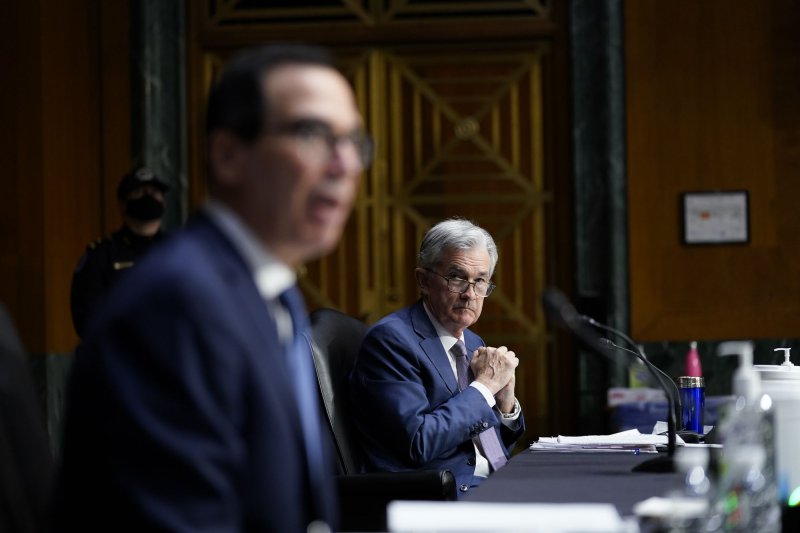1 of 5 | Treasury Secretary Steven Mnuchin (L) testifies Tuesday as Federal Reserve Chairman Jerome Powell listens at a Senate Banking Committee hearing on Capitol Hill. Pool Photo by Susan Walsh/UPI |
License Photo
Dec. 1 (UPI) -- Treasury Secretary Steven Mnuchin and Federal Reserve Chairman Jerome Powell expressed very different opinions on the U.S. economy's prospects Tuesday during a Senate hearing.
The two were close allies when the coronavirus pandemic first struck in March but have since diverged, with Powell advocating continued strong levels of economic aid to businesses, governments and individuals amid continuing uncertainty.
Mnuchin, meanwhile, is now calling for limited aid and is blaming public health shutdowns for the country's economic woes.
Each agenda was on display at a Senate banking committee hearing called to discuss implementation of the $2 trillion CARES Act, which was passed in March as the government's first major economic answer to the health crisis.
Powell called the U.S. economic outlook amid a surge of new COVID-19 infections "extraordinarily uncertain," especially heading into winter, and warned of "tough" months ahead, which could see many small businesses fold before the widespread availability of a vaccine.
"For now, significant challenges and uncertainties remain, including timing, production and distribution, and efficacy across different groups," he said.
He added that there was a "great risk" that the effects of the pandemic could worsen existing economic inequality in the nation.
"There's a real concern that if we don't act as quickly as possible to support those people, get them back to work, get the economy up and running as much as possible, that we'll leave behind a more unequal situation," he said.
In prepared remarks, he called for the continuation of several Federal Reserve lending programs established by the CARES Act that are set to expire at the end of the year.
Under the law, the Fed must return any unused CARES funds to the Treasury on Dec. 31. Slightly more than $100 billion has been given through lending programs that now face a phase-out -- including the Main Street lending facility, which provides financing to small- and medium-sized businesses.
"These programs serve as a backstop to key credit markets and have helped restore the flow of credit from private lenders through normal channels," Powell said. "We have deployed these lending powers to an unprecedented extent."
Mnuchin, however, says those funds would be better spent elsewhere and announced last month that he would end several of those emergency loan programs -- a move Powell has opposed.
In his appearance Tuesday, Mnuchin praised what he called a rebounding economy, noting that the unemployment rate had dropped faster than expected, and said future aid should be narrowly targeted.
"Based on recent economic data, I continue to believe that a targeted fiscal package is the most appropriate federal response," the treasury secretary said in his prepared remarks.
He placed blame on economic shutdowns in parts of the country with soaring COVID-19 rates for causing "great harm" to businesses and workers.
Sen. Sherrod Brown, D-Ohio, said Mnuchin appeared to be "trying to sabotage our economy on the way out the door" with his move to end the Fed lending programs in the Trump administration's final days.
"Either you're purposely trying to stop President-elect [Joe] Biden and Treasury Secretary-designee [Janet] Yellen from getting to work for the people we all serve, or you're delusional," he said.
Mnuchin responded, saying extending the facilities "was not an economic decision" before reading from the legislation, stating he did not believe it was Congress' intention for those facilities to remain in place indefinitely.
Sen. Patrick Toomey, R-Pa., agreed with Mnuchin's assessment, saying it was the responsibility of Congress to determine how to aid "probably insolvent companies and that the Fed's emergency lending power should not act as a replacement for fiscal policy.















